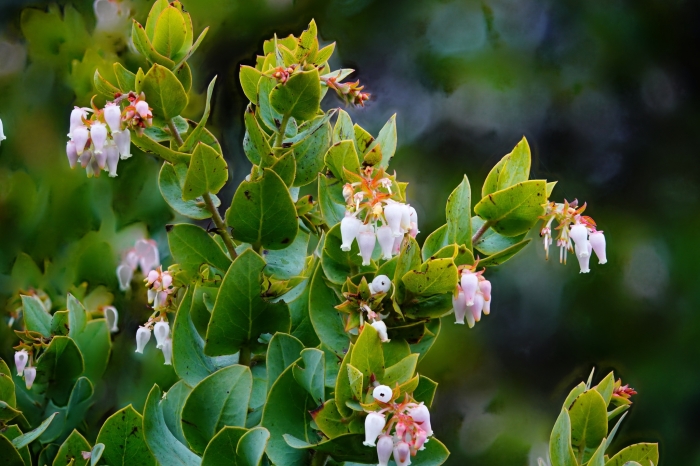Pallid Manzanita
(Arctostaphylos pallida)
Pallid Manzanita (Arctostaphylos pallida)
/
/

© Michael Warner
CC BY 4.0
Image By:
© Michael Warner
Recorded By:
Copyright:
CC BY 4.0
Copyright Notice:
Photo by: © Michael Warner | License Type: CC BY 4.0 | License URL: http://creativecommons.org/licenses/by/4.0/ | Uploader: ouzel | Publisher: iNaturalist |

























Estimated Native Range
Summary
Arctostaphylos pallida, commonly known as Pallid Manzanita, is an evergreen shrub native to chaparral and oak woodlands, specifically in the eastern San Francisco Bay Area of Northern California. It typically grows to a height of 6-13 feet and features reddish or grayish bristly branches. The leaves are ovate to triangular, bristly, and clasping. From November to March, it produces urn-shaped white flowers that are modestly showy. This species is adapted to serpentine soils, often chert and shale, within its native chaparral habitat.
Pallid Manzanita is valued for its unique appearance, with its pale bark and bristly texture providing year-round interest. It is used in native plant gardens, restoration projects, and as an ornamental in residential landscapes where its drought tolerance is a significant benefit. It requires well-drained soils, typically thriving in the same serpentine substrates it occupies in the wild, and prefers full sun to partial shade. While it is drought-tolerant once established, it benefits from occasional water during prolonged dry periods. Gardeners should be aware that Arctostaphylos pallida is susceptible to root rot if overwatered or planted in poorly drained soils. Due to its threatened status, it is important to source plants from reputable nurseries that propagate from cultivated stock rather than from wild populations.CC BY-SA 4.0
Pallid Manzanita is valued for its unique appearance, with its pale bark and bristly texture providing year-round interest. It is used in native plant gardens, restoration projects, and as an ornamental in residential landscapes where its drought tolerance is a significant benefit. It requires well-drained soils, typically thriving in the same serpentine substrates it occupies in the wild, and prefers full sun to partial shade. While it is drought-tolerant once established, it benefits from occasional water during prolonged dry periods. Gardeners should be aware that Arctostaphylos pallida is susceptible to root rot if overwatered or planted in poorly drained soils. Due to its threatened status, it is important to source plants from reputable nurseries that propagate from cultivated stock rather than from wild populations.CC BY-SA 4.0
Plant Description
- Plant Type: Shrub
- Height: 6-12 feet
- Width: 6-10 feet
- Growth Rate: Moderate
- Flower Color: Pink, White
- Flowering Season: Spring, Winter
- Leaf Retention: Evergreen
Growth Requirements
- Sun: Full Sun, Part Shade
- Water: Low
- Drainage: Medium, Fast
Common Uses
Bee Garden, Bird Garden, Drought Tolerant, Hummingbird Garden, Low Maintenance
Natural Habitat
Native to chaparral and oak woodlands, often on serpentine soils
Other Names
Common Names: Pallid Manzanita
Scientific Names: , Arctostaphylos pallida, Arctostaphylos andersonii var. pallida, Arctostaphylos andersonii var. pallida, Arctostaphylos andersonii var. pallida,
GBIF Accepted Name: